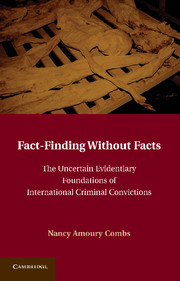 Fact-Finding without Facts
Fact-Finding without Facts Book contents
- Frontmatter
- Contents
- Acknowledgments
- Introduction
- 1 The Evidence Supporting International Criminal Convictions
- 2 Questions Unanswered: International Witnesses and the Information Unconveyed
- 3 The Educational, Linguistic, and Cultural Impediments to Accurate Fact-Finding at the International Tribunals
- 4 Of Inconsistencies and Their Explanations
- 5 Perjury: The Counternarrative
- 6 Expectations Unfulfilled: The Consequences of the Fact-Finding Impediments
- 7 Casual Indifference: The Trial Chambers' Treatment of Testimonial Deficiencies
- 8 Organizational Liability Revived: The Pro-Conviction Bias Explained
- 9 Help Needed: Practical Suggestions and Procedural Reforms to Improve Fact-Finding Accuracy
- 10 Assessing the Status Quo: They Are Not Doing What They Say They Are Doing, but Is What They Are Doing Worth Doing?
- Conclusion
- Bibliography
- Index
- References
6 - Expectations Unfulfilled: The Consequences of the Fact-Finding Impediments
Published online by Cambridge University Press: 05 October 2010
- Frontmatter
- Contents
- Acknowledgments
- Introduction
- 1 The Evidence Supporting International Criminal Convictions
- 2 Questions Unanswered: International Witnesses and the Information Unconveyed
- 3 The Educational, Linguistic, and Cultural Impediments to Accurate Fact-Finding at the International Tribunals
- 4 Of Inconsistencies and Their Explanations
- 5 Perjury: The Counternarrative
- 6 Expectations Unfulfilled: The Consequences of the Fact-Finding Impediments
- 7 Casual Indifference: The Trial Chambers' Treatment of Testimonial Deficiencies
- 8 Organizational Liability Revived: The Pro-Conviction Bias Explained
- 9 Help Needed: Practical Suggestions and Procedural Reforms to Improve Fact-Finding Accuracy
- 10 Assessing the Status Quo: They Are Not Doing What They Say They Are Doing, but Is What They Are Doing Worth Doing?
- Conclusion
- Bibliography
- Index
- References
Summary
The foregoing chapters show that international criminal trials at the ICTR, SCSL, and Special Panels are beset by a variety of fact-finding impediments. Virtually the only evidence presented to these bodies takes the form of eyewitness testimony, and this testimony is frequently problematic in numerous regards. Witness accounts routinely fail to include information that is crucial to a defendant's ability to refute the witness's allegations and to a fact finder's ability to ascertain what actually happened. Questions regarding dates, times, distances, numbers, and other key details, for instance, often go unanswered so that witness testimony is rendered vague and difficult to challenge or verify. The information that witnesses do provide frequently contradicts the information previously provided by that witness or by other witnesses, and the Trial Chambers have little basis for deciding between competing accounts. The foregoing chapters also examine various factors that may explain these testimonial deficiencies. They explore the linguistic and cultural divides that impede communication between witnesses and their in-court interlocutors, for instance, and they bring perjury out of the shadows.
As I have discussed in previous chapters, these testimonial deficiencies can gravely impair the fact finder's ability to evaluate the credibility of witness testimony and to find facts generally. It is difficult to ascertain just how grave the impairment is, but I begin this chapter by delineating a number of factors that provide some insight into the question.
Information
- Type
- Chapter
- Information
- Fact-Finding without FactsThe Uncertain Evidentiary Foundations of International Criminal Convictions, pp. 167 - 188Publisher: Cambridge University PressPrint publication year: 2010